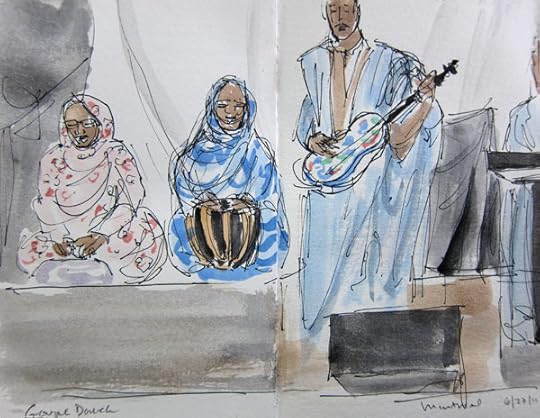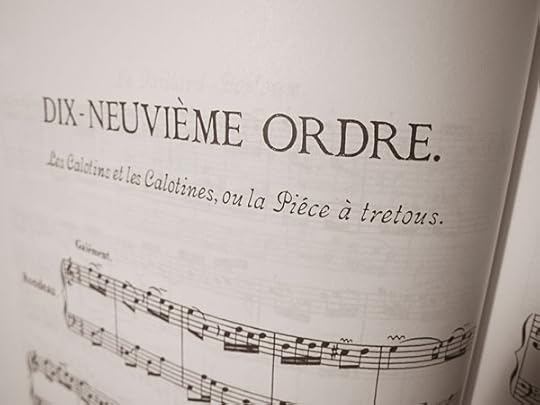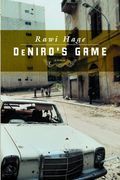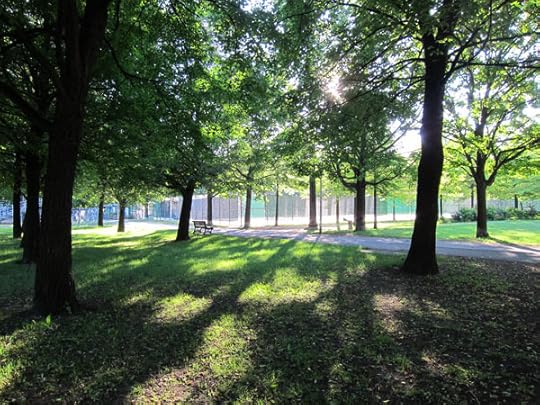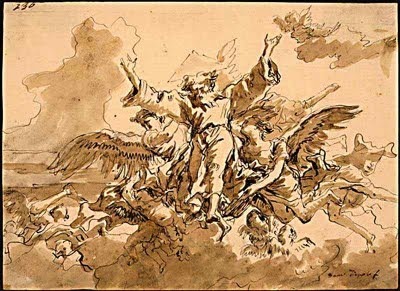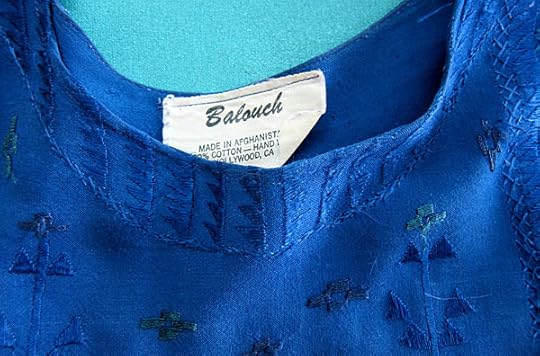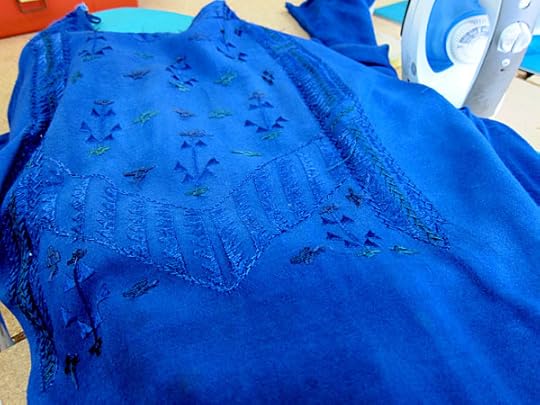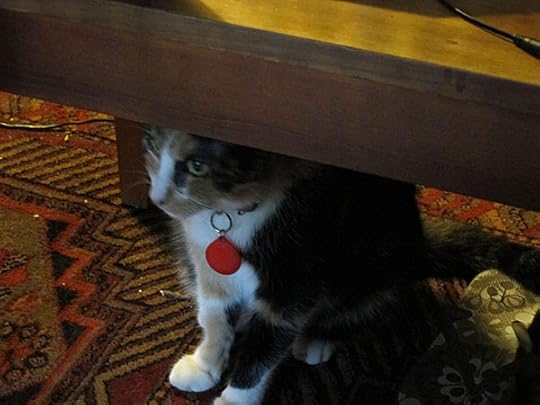Elizabeth Adams's Blog, page 116
June 28, 2011
Far Away
Groupe Doueh at the Montreal jazz festival, last night.
After many days of rain, yesterday was beautiful, and so we decided to head down to the jazz festival for the evening. At eight pm, when we arrived at the world music stage, it was still light, and Groupe Doueh, from the western Sahara, had just begun their set. A tall thin guitarist stood in the center of the stage, barely moving; to his left was a keyboardist, and three large Muslim women sang, played percussion, and danced in slow graceful movements. I usually love all the world music performances, but this particular concert seemed lackluster, except for the presence of the woman in pink - she was older, perhaps 60, and connected with the audience. I wondered if the group, whose music I had heard online and liked, was tired, or even if something unpleasant had happened before they played. After a while we and others drifted away, looking for other venues.
As the sun went down, J. and I sat on a curb in back of the big stage in the plaza of Place des Arts, listening to Galactic. Behind us, people came and went along the barricades across Jeanne-Mance, beneath the large banner strung up across the street, "Au Revoir!" Watching the visitors to the jazz fest is almost interesting as listening to the music; the very young couples in their skimpy summer outfits, elaborate tattoos, or attempts at elegance; the businessmen in suits, their briefcases tucked between their feet as they stand to listen to a few songs before heading home on the metro; the obvious tourists; the jaded concert-goers with their folding chairs and ever-present glasses of beer. So I noticed the woman with the three boys, unlike any other family passing by. The boys, skinny versions of each other differing mostly by height, wore white caps and dark clothing; the youngest one clung to his mother's hand and the older two carried large white duffle bags. The mother was completely robed in dark brown cotton, head to toe, a large woman who would normally float along the street with a serene presence, but instead she moved uncertainly, looking around, tracing zig-zags along the sidewalk, pulling the littlest boy along with her. They crossed Jeanne-Mance and headed for the center of the city, but in fifteen minutes they came back in the opposite direction. Were they family members of the group we'd just seen? I'm not familiar enough with different styles of dress or facial features to know, but it seemed clear to me that they had gotten turned around somehow, or missed a preveiously-agreed meeting place. As we left to pick up our bikes and go home we saw them again, patiently waiting on a curb, while two teenage girls, wearing flimsy skirts, turned cartwheels down the middle of the street.
June 24, 2011
Celebrating la fête nationale...lentement
A set of pieces from Book Two of Francois Couperin's (1668-1733) Complete Works for Keyboard, this one (as usual) with an enigmatical title: "The Calotins and Calotines" (members of a secret order) "or The Piece for Everyone."
Today, St-Jean-Baptiste Day, means that summer has officially begun. It's felt like "vacation" began for a lot of people at the beginning of this week though, with fewer and fewer cars each day in the parking lot at our studio. On Wednesday we went to the park for a picnic with a friend, and saw large crowds of people, just hanging out, playing music, smoking, talking, drinking wine. The party of friends relaxing on a blanket next to us included a tiny baby -- less than a week old -- and the baby tote bag on their stroller had a photo of Che Guevara on it. Beyond them, a young woman serenaded her boyfriend on the guitar, and a Slavic-looking young man searched vainly in the grass for his lost keys.
What's going on? we asked. Why so many people out so early? Our friend said, Oh, today is a slow day. What's that, we asked? You know, she said, a day when you go to work but no one does much.
An official "slow day" in other words. Never heard of such a thing, we hopeless Americans.
But we're trying. We were out late last night at a surprise birthday party for a close friend, and still in bed at 10:00 am this morning when we heard the bells from Eglise St-Jean-Baptiste, far up rue Rachel toward the mountain, calling the faithful to join the Cardinal and his retinue for the annual celebratory mass. Later there will be a big parade, starting a few blocks from us, but this year, with the Parti Quebecois so severely routed in the last election, and most of its leaders resigned from their positions, the hardcore separatists may be pretty subdued. But I'm with the blue-and-white flag-wavers who see this national day as a community celebration of French culture. Montreal would be an entirely different city without its French history, ambience and language, and I doubt we would live here or love it the way we do. And the French, who know how to enjoy life, are teaching me something about going slower, at least once in a while.
So, on this rainy cool morning it seemed right to begin with coffee and the courtly rhythms of Couperin at the keyboard. Maybe, later, we'll melt into a little Ravel...
Francois Couperin, Les Barricades mystérieuses ("the mysterious barricades"), Carlos Rodriguez, harpsichord
June 23, 2011
Not Hunting Deer: Thoughts on "De Niro's Game"
by Rawi Hage
Fellow Montrealer Rawi Hage's first novel, "De Niro's Game" is not a comfortable read, especially for those of us who had family and friends in Beirut during the Lebanese civil war, but I was riveted to the book from start to finish. Hage is a skillful and often poetic writer, especially when it comes to creating believable characters in the center of what is often an unbelievably horrible situation. You may not like them, but you won't forget them. His control of the action was complete, and his description of the psychological state of the protagonist was remarkably successful at bringing this reader -- in her North American apartment with reliable running water and electricity, undamaged plaster, and an intact family -- into the surreal claustrophobia of constant war, random death, interrogation, terror, and the shifting loyalty of friends, as well as the alienation of young people facing a mortally dangerous and completely uncertain future.
Readers who aren't familiar with the nuances of Middle Eastern politics may be shocked at what is revealed here, but I found its unflinching truth, seldom accurately reported in the media, most welcome.
Others may be distressed at the way relationships between the sexes are portrayed, but both from my own experience and as an editor, I felt that this view seemed accurate, coming from the narrator, and I thought Hage was courageous in writing the character of his protagonist as he did, knowing readers would assume he himself felt -- or even acted -- the same way. There was little sympathetic balance to this male point of view; I wished we had learned more about the lives and psyches of the two young women with whom he becomes involved, not to mention the mother, aunt, and stepmother whose behavior is criticized but not fully explained.
But the impact of "De Niro's Game" hinges, in fact, on the description of a lot of so-called "negative" behavior and the way the author simply lays it out as fact, for us to digest and deal with. The questions that remain - how would I have acted in his place? in her place? - are the source of both its lingering discomfort and its power.
This comment was also posted as a review at my site on Goodreads.
June 22, 2011
On the longest day
I walk across the park at 6 am, toward the sun, who lays his hot hand on my neck. So early, I say. But we're both awake...
He binds me with his fine lines, his passion for color in these brief months of closeness.
And I long for him when he's distant, having his pleasure in the south -- my lover who still sends me pictures drawn with shadows on the January snow.
June 20, 2011
The strange intoxication of a day of serial intimacy with...
June 18, 2011
Music for Trinity: Palestrina to Messiaen, with a Russian detour
Now that Christ has ascended, and the Holy Spirit descended (last week, on Pentecost), the liturgical calendar marks tomorrow as Trinity Sunday, the end of the Easter season and a feast celebrating the Trinity of Pater, Filius, et Spiritus Sanctus. Please don't ask me to explain it to you! It's probably better to listen to music that approaches "le mystère de la Sainte Trinité," in the words of Olivier Messaien.
The practical part is that Trinity Sunday is the beginning of "ordinary time" -- that long, long season of green vestments and altar cloths stretching all through the summer and fall. It means in another week we go on "chori vacation" for a couple of months, and those who show up to sing on Sunday mornings won't have to put on heavy cassocks and surplices.
Tomorrow, however, we will, but we'll be singing some glorious music while we sweat, and hearing more on the organ. Here's the full program, below; Evensong will be broadcast live/streamed live on the internet on Radio Ville-Marie at 4:00 pm Eastern Daylight Savings Time, so if you'd like to end your weekend with an hour-long concert of almost-all-Russian choral music, here's a rare chance to do just that. The Rachmaninoff piece is from his "All Night Vigil," one of the great, great works of liturgical music.The inks in teh programme below give information and a few include online resources for listening.
It's a Sunday for poetry too: I am one of the lectors, and was surprised and happy to to see that the passage I'll be reading is Genesis 1:1, "In the beginning God created the heavens and the earth ."
TRINITY SUNDAY, CHRIST CHURCH CATHEDRAL, MONTREAL
10:00 am Choral Eucharist
The Cathedral Singers
Prelude: Le Mystère de la Sainte Trinité from Le Corps glorieux [Messiaen himself: Grooveshark], Olivier Messiaen (1908-92)
Mass Setting: Missa Brevis, Kenneth Leighton (1929-88)
Introit: O lux beata Trinitas [text] [Leeuwarder Madrigaalkoor: YouTube], William Byrd (1540-1623)
Motet: O beata Trinitas [text] [Skinner: NML] (info), Giovanni Pierluigi da Palestrina (1525-94)
Postlude: St. Patrick's Breastplate - Allegro maestoso from Sonata Celtica , No. 4 in c, Op. 153 [Payne: NML] (info), Charles Villiers Stanford (1852-1942)
4:00 pm Evensong
The Cathedral Singers
Prelude: Gloria tibi Trinitas, John Bull (1562-1628)
Introit: Cherubic Hymn [text] [YouTube], Dimitri Bortniansky (1751-1825)
Preces and Responses: " Dresden ," John Sanders (1933-2003)
Psalm: 146 (Atkins)
Magnificat: [Polyansky: YouTube], Sergei Rachmaninoff (1873-1943)
Nunc Dimittis: [Kelly: YouTube], Alexander Gretchaninoff (1864-1956)
Anthem: Hymn to the Trinity [text] [St. Louis Cathedral: YouTube], Pyotr Tchaikovsky (1840-93)
Postlude: Gloria tibi Trinitas, John Bull
June 16, 2011
Of Folkwear and Afghani Tunics
I've had my sewing machine out lately -- the newly-painted bedroom, with its new IKEA curtain system, needs curtains -- and today as I was getting dressed I noticed a sewing project hanging in my closet. A much overdue sewing project.
This is an embroidered afghani tunic in a style that was popular back in the late 1960s and early 1970s, which is when I bought it. "India imports" of bedspreads, clothing, rugs, incense and jewelry started in those days, popularized by the Beatles' trips to India and the hippie craze for color, pattern, sitar music and enlightenment. I can still remember my first trips to "Utica Leather," which wasn't even in head shop category, but was full of the stuff we all thought was very cool: leather bracelets, handmade sandals, incense cones and burners. I still have a small brass bell on my keyring that came from that shop.
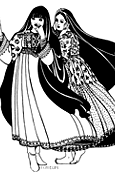 Utica Leather didn't carry much clothing, but there was a small shop called The Angel in Poolville, New York, run by the wife of a Colgate professor that specialized in higher-end imported clothing from India and Asia, and on special occasions my mother and I went there. I had been sewing for years and was already a textile freak at age 15 or 16, and I found combinations of colors, patterns, and details intoxicating. I still do. All through the 70s and into the 80s I collected fabrics and Folkwear patterns, planning elaborate projects -- most of which never got made. (That's the "Afghan Nomad Dress" pattern at left)
Utica Leather didn't carry much clothing, but there was a small shop called The Angel in Poolville, New York, run by the wife of a Colgate professor that specialized in higher-end imported clothing from India and Asia, and on special occasions my mother and I went there. I had been sewing for years and was already a textile freak at age 15 or 16, and I found combinations of colors, patterns, and details intoxicating. I still do. All through the 70s and into the 80s I collected fabrics and Folkwear patterns, planning elaborate projects -- most of which never got made. (That's the "Afghan Nomad Dress" pattern at left)
I'm not sure if this tunic, made of extremely soft cotton, came from the Angel or from a shop in Ithaca, later on, but I do know I loved it and wore it a great deal, until it became too tight in the armholes and around my ribs -- it's all that singing! But I've been unwilling to part with it, and have been carting it around ever since, waiting for the day when I'd take it apart, knowing there was enough fabric in the long shirttails to add gussets in the underarms and down the sideseams.
Today I opened the carefully sewn French seams and ran my figertips over the silk embroidery, wondering about the Afghani woman who must have sewn this garment all those years ago. What would these years have been like if women had made more of the decisions? Instead, our world really is rent at the seams.
June 14, 2011
Poems from the via negativa
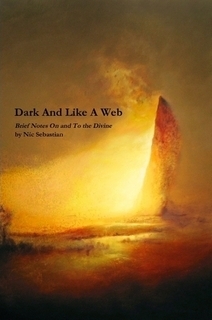 Nic Sebastian's new chapbook, Dark and Like a Web: Brief Notes On and To the Divine, edited by yours truly, has just been published under the Nanopress model that Nic invented. Under this type of publishing, the author partners with an editor to work closely on the manuscript until it is ready for self-publication. The book is then made available in various forms, including an online edition with all the poems in written and audio form, an e-book, a free .pdf download, and an inexpensive print edition and audio CD sold at cost through Lulu. The goal of nanopress publishing is primarily to get the poems into the hands (and ears) of as many readers as possible -- and of course it helps if the author (and editor) have established online presences and the ability to self-publish a quality book in all these forms. What I'm doing at Phoenicia Publishing is, of course, different, and, like the authors I work with, our goals are somewhat different too. I was glad to participate in this project with Nic. As in my work with Dave Bonta and all the wonderful writers at qarrtsiluni, I think we all need to cooperate and experiment with various forms of publishing in a new environment, and to use the web and new technologies creatively for the benefit of both writers and readers.
Nic Sebastian's new chapbook, Dark and Like a Web: Brief Notes On and To the Divine, edited by yours truly, has just been published under the Nanopress model that Nic invented. Under this type of publishing, the author partners with an editor to work closely on the manuscript until it is ready for self-publication. The book is then made available in various forms, including an online edition with all the poems in written and audio form, an e-book, a free .pdf download, and an inexpensive print edition and audio CD sold at cost through Lulu. The goal of nanopress publishing is primarily to get the poems into the hands (and ears) of as many readers as possible -- and of course it helps if the author (and editor) have established online presences and the ability to self-publish a quality book in all these forms. What I'm doing at Phoenicia Publishing is, of course, different, and, like the authors I work with, our goals are somewhat different too. I was glad to participate in this project with Nic. As in my work with Dave Bonta and all the wonderful writers at qarrtsiluni, I think we all need to cooperate and experiment with various forms of publishing in a new environment, and to use the web and new technologies creatively for the benefit of both writers and readers.
When Nic first asked me to edit these poems, I was excited because they spoke to me personally, and were already close to being ready for publication. Actually, I would have been happy to publish the chapbook at Phoenicia. These are "via negativa" poems, looking at the divine obliquely, and through obscurity -- and that makes sense to me. The book includes process notes from both Nic and me, and an explanation of how we came up with "Broiled Fish and Honeycomb Nanopress." Here's just one of many favorite poems from the collection, but I urge you to read the whole chapbook, where a greater meaning emerges as one poem and one experience is followed by another.
the girl and the hours
the girl lives in an iron shack
her homeland is red
it is dry the passing of the first hour is rich
blue salt, the second
emerald oboe
the girl pulls up
a rough wooden chair
in hot wind
she observes the sleek hours
passing in single file before her
on a catwalk
one is smoking vermillion
another dream black and muscled
dark whale song
the striding hours are elegant
they have a fine sense of color
and they are not afraid
the girl watches deeply
under constant sun, never feels
she is alone
This was an interesting project for me as an independent editor with no real stake in the final product other than trying to help make the book as good as it could be. As each project does, I felt like it taught me a lot and moved me forward in my understanding of what we're doing as writers and editors -- and I tried to talk about that in my editor's note, part of which appears below:
I was impressed throughout by how well Nic knew her work and herself. When I asked, "why this particular word," or "what exactly were you trying to express here" or "I'm not sure about this repetition, what do you think?" she had an answer; she knew what she was doing and reaching for. I also tried to give clear reasons for my own reservations and suggestions. Because of this, it became quite easy to make decisions about improvements. Some were obvious. Others, much more subjective. But because neither one of us was digging in, we never got to an impasse; we listened, knowing that the shared goal was to make the chapbook as good as it could be. I strongly believe that the editor's role should, in the end, appear as transparent as possible, and that a successful project is one which not only reflects the author's original vision and voice, but concentrates it.
But that's only one side of the story.
When we create, I think we all long for the close reading, the deeply attentive listener or viewer. Making our work public is an act of courage, risking not only dismissal or rejection, but also intimacy. Editing, by its very nature, requires an intimate engagement with the text, closer perhaps than anyone's but the author. I see that intimacy as both a responsibility and a great privilege.
I'm changed each time I enter deeply into the words and world of other writers who have asked me to edit their work. Certain phrases and ideas enter me, and they stay. In one of my favorite poems in this collection, Nic asks, "how have you sharpened/into this thin bright hook/pulling me after you still/as though you were some great moon and I/some helpless tide." This stunning image speaks equally to me about the pull of the divine, and the pull of the creative impulse, two forces not so separate as they may seem."
June 13, 2011
Painting
During the past two weekends, thanks to clouds and rain, we've been painting our bedroom. Since buying this condominium several years ago we have done very little in the way of improvements. It was in good shape when we bought it, and we liked the colors everywhere except the bedroom, which was wallpapered in a dark green, almost black, tartan plaid. I kid you not. We immediately painted that room a pale green, but - I should have known better - greens are tricky, and in the particular light of that particular room, with yellowish trim and ceiling, this green didn't make it. We lived with it because we couldn't bear the idea of moving the furniture to paint the trim and ceiling, which we should have done in the first place. Well, we've done it.
The color scheme is neutral: three shades of off-white tending progressively toward brown, the lightest white on the satin-finish trim. The walls are not even dark enough to be called cafe-au-lait. It's nice. Peaceful. Much better.
But what I've been thinking about, during all those meditative hours of masking the panes in the French doors and edging the baseboards, are all the other hours - days - of painting surfaces in our home in Vermont. We must have painted every wall and moulding in that house at least twice during the thirty years we lived there, and J. sanded and painted the entire outside of the house as well, stripping off the old alligatored lead paint right down to the original clapboards. We built a two-storey garage/studio during our time there, and painted all of that too - not to mention the sheetrock, the taping, the joint compound, or the joys of raising wallboard up onto a ceiling.
When I remember those Saturdays and Sundays, I think of what we were listening to. Yankees and Red Sox baseball games, including the memorable World Series that was the last for Reggie Jackson. Saturday Afternoon at the Opera, with Vermont's own Peter Fox Smith as announcer - we were doing pro bono design work for VPR at the time: a logo, their program guides, and often helped with the on-air marathons so we got to know all the announcers and technical staff pretty well. "All Things Considered," back in the days of Susan Stamberg. Lots of jazz: Don Cherry, John Coltrane, Charlie Haden, Chick Corea, Pat Metheny, Oscar Peterson, Miles Davis. Old favorites from the Beatles to Cream, and the typical 80s pop stuff: Tina Turner, Michael Jackson, Dire Straits, Madonna -- we even named our first cat after her.
This time we had a little Sandy Denny retrospective, and one of Elton John, and heard some old jazz, but when I was working alone I listened not to the radio or CDs, but to internet podcasts or live streams, mostly on Radio Open Source: Christopher Lydon's interviews with Teju Cole, Lydia Davis, Mustafa Barghouti, Edna O'Brien, and Martin Marty (the latter talking about his recent book on Dietrich Bonhoeffer.) As I worked and listened my mind kept casting back to those earlier days, when I was certainly a reader but hadn't yet become a writer, and certainly not a publisher. Was I the same? How had I changed? And our world! Those early days with paintbrush in hand and a small computer tucked away in an upstairs room: an Osborne running CP/M, with its tiny flickering screen useful for rudimentary word processing and the spreadsheet and database programs we were just beginning to learn; a time before anyone had conceived of blogging, when I often felt intellectually lonely and just wanted a few people to talk to who were also obsessed with books and ideas...
June 8, 2011
Rain
This morning, the woman in the apartment above us watered the plants on her terrace. First I heard the sound of the pressurized hose. Then I looked up and saw water cascading from the roof of our balcon, a thick determined sheet of strange rain, falling against a background of bright sunlight.
Tonight the air has gotten progressively heavier and now there are flashes of light and rumblings of thunder that sound like they're still well beyond the St. Lawrence, hanging unwelcome above the miserable, flooded plans of the Richelieu. The cat hides, alert, under the low roof of the coffee table, a small simple plank of cherrywood on four tapered legs that my father made for me when I was a child. I silently agree with her; it's the most comforting object in the house.
Two more loud claps, and then a burst of rain that ends quickly, giving over to the sound of wheels passing through puddles. Voices. Laughter. Rumbling, now heading north toward the Laurentians. The cat gets up, stretches, and heads into the kitchen to check her bowl.

